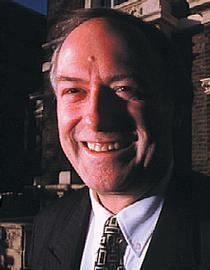"I worked in Spain and Latin America for six years. It was fascinating to work in a developing country like Brazil. I was involved quite a lot in the construction industry as many of Longman's customers were engineers. I became interested in the part played by construction and engineering in developing countries."
After a decade abroad, Amey returned to work at Longman hq, with a brief covering the Far East, Americas and Europe. It wasn't long however, before he was headhunted by the BBC. "I joined as head of the BBC English Department of the World Service. My brief was to regenerate the educational broadcast side. It required a lot of investment in programming, and in raising the profile of the BBC's distance learning role."
Here Amey reveals one of his key passions: learning and education. "Distance learning is enormously important, using broadcast to reach people in remote parts of the world." He also believes it's an important role for CIBSE, and is proud of the fact that the Institution's website is proving so popular: "Twelve thousand hits a month."
From the BBC World Service, Amey spent two years with a special unit at the DTI working under then President of the Board of Trade, Michael Heseltine. In this role, Amey looked after the development of media and educational programmes for the development of young professionals in several industry sectors, including construction.
The next five years were spent as director general of charitable trust, Canning House. "It aims to provide business and educational links between Britain and the Spanish and Portuguese speaking world. Members included large corporations such as ICI, HSBC, and Unilever, as well as small businesses."
During this time, Amey was involved in finding funding from the DTI, FCO and European Union – skills which are standing him in good stead at CIBSE.
"After my five year tenure at Canning House was up, I could have returned to the Foreign Office but I heard that CIBSE were looking for a chief executive. I felt that the range of skills required for the post were a good match with my experience," says Amey.
As someone with a background in media, it is understandable that Amey is keen for the Institution to raise its profile and send out a strong message. "My ambition is to help CIBSE become better known and more widely respected among hits stakeholders: government, the construction and engineering industry, members of this institution, and members of other institutions in the engineering field with whom we work closely.
"These stakeholders are our future. That is the environment in which we work. We need to be better understood."
Amey feels that CIBSE is operating from a position of strength. "I would like to see our membership rise from 18 000 to 25 000. We have a strong financial position but we don't want to grow too much: bigger isn't necessarily better. For CIBSE, medium-sized is best. We have a critical mass of members. We are small and quick enough to spot opportunities and move quickly to work with them." He is particularly keen to grow international membership, and has just returned from a trip to Hong Kong to see the CIBSE team out there. "We are going to give extra resources to Hong Kong to develop their work, and to help us into mainland China."
Amey's vision is of a medium-sized institution which is confident enough to have its say in the wider issues affecting construction and to be respected by its members, peers and government. But he doesn't see CIBSE making loud demands:
"It's not about being a lobbying body, but using our status as a learned society to influence thinking. We need strong ideas backed by well-researched evidence. We want to do things in a more sophisticated way. You don't have to shout to be heard. You just need a strong message, but spoken quietly."
Source
ÐÇ¿Õ´«Ã½ Sustainable Design

















